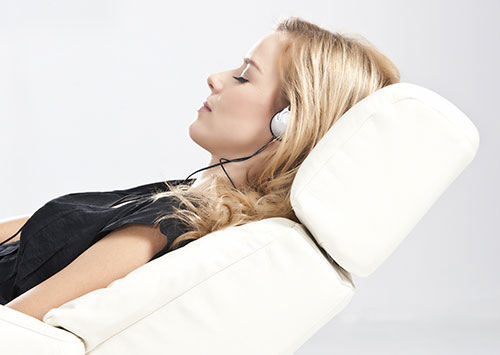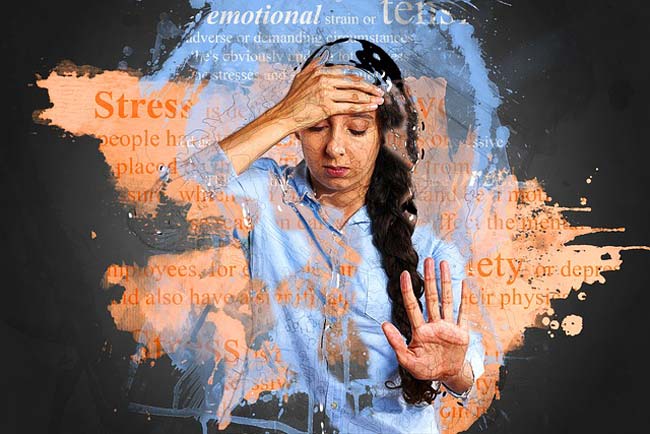Before we get into how hypnosis can help anxiety, and I give you my first-hand experience, let's make sure we understand exactly what hypnosis is.
Hypnosis introduces you to a state where your unconscious mind comes to the surface, where you are potentially more available to suggestion.
Through its use in therapy by experienced practitioners, one is able to access memories and modes of sub-conscious behavior seemingly repressed and thrust into a distant corner of the mind.
Therapeutically, hypnosis is used as a tool for helping edit the mind of unhelpful thoughts.
To understand what hypnosis truly is, we first have to define the conscious and unconscious minds as two separate processes or mind-states, the former smaller part for every-day life and the larger latter function that governs everything else you think about.

Understanding the Conscious Mind
Let's get some perspective here in regards to what function your conscious mind directs. Everything you need to govern your everyday life and how you regard yourself as a person to the world outside you falls into this category.
It controls value judgments and choices we make, such as actions linked to anxiety and confidence issues.
Data is interpreted through external language systems devised and created by other conscious human, which we externally translate.
The conscious mind seeks control and seemingly holds the final choices we make.
However, what function enables our minds to automatically translate functions we take for granted, like speaking your native language or having knowledge of everyday signs?
Where is this information stored and how is it accessed mechanically? Now you're entering the much larger mental environment of unconscious function.
Understanding the Unconscious Mind
This is everything else you take for granted. As discussed above, it deals with flow of accessing and translating information stored in our minds for functions we take for granted, like language and mathematics.
But it goes even deeper, to functions like emotions and other defense mechanisms utilized as patterns every day.
Think of everything else that steams up, all that stuff that lends you creativity, all that stuff that confounds you, all that stuff that creates links between your mind and how it directs your autonomic processes such as nervous system, immune system, blood pressure and cellular reaction (amongst other things).
This part of your mind is like the population of the world compared to you.
These autonomic functions discussed above are something not directed consciously, so we define them as unconscious, or everything else.
Is it possible those sort of functions are related to or overlap with emotions we have? What if we have a function where the emotions and body functions overlap?
You might have an unreasonable fear of toasters if you were burnt by one as a child and every time you see one, you start shaking uncontrollably. That's your unconscious mind defending you and telling you not to get burnt again.
These unseen cerebral mechanisms seem inaccessible for the most part, and would probably be too much for us to cope with on a conscious level for everyday functioning.
What if we could alter unconscious behaviors linked to anxiety and confidence issues? Is it possible we could actually access these functions externally in order to edit these unhelpful thoughts and behaviors?
Enter hypnosis…
How Hypnosis Works
Hypnosis works through communication with the unconscious mind, theoretically a state of thought that isn't communicated externally or even given voice mentally.
In order to answer how hypnosis works, the inevitable question arises does hypnosis work? Some claim hypnosis is a placebo, and the subject is in fact “method-acting” the part of a hypnotized person.
However, there is sufficient data to confirm successful results in hypnotic therapy, and regardless of whether or not hypnosis is a placebo, the practitioner plays the role of director in the screenplay of the mind's method-acting.
The actual science operates not on a master-slave premise, but rather one where the subject has free will. Rather than the subject being half asleep, they're actually in a hyper-attentive state, which is why they're open to suggestion.
It then works by bypassing the conscious mind through relaxation or linguistic techniques, and speaks to the unconscious mind in its own coding – pattern, symbolism and association.
How Effective Can Hypnosis Be for Anxiety?
Hypnosis has yielded legitimate results in medical journals and is taken seriously in the therapeutics industry.
There are four typical therapeutic uses of hypnosis that address physical tension/strain, emotional strain/moodiness, phobic reactions and sleeping disorders. For the purpose of this article, we'll be focusing on its remedial effects in combating anxiety.
But Can Hypnosis It Cure My Anxiety?
How truly effective hypnosis is depends on how open the subject is to hypnotic suggestion, as you'll see from my test results in a moment. Some people may be very resilient to suggestion, whereas others may be put into a suggestive state fairly easily.
However, it is my opinion that it isn't black and white. I believe everyone can benefit. I have, and I'm very resilient, skeptical and opinionated 🙂
How Long Does It Take to Be Cured?
Factors to take into account are the severity of the disorder the subject has, and how open by default the subject is to hypnosis. There may also be other more complicated blocks for your therapist to overcome.
The unconscious mind is incredibly complicated and not ordered in any linear fashion, because we can't see how things are processed by our mind.
One function when we flinch against sudden movement could be related to an emotion we had when we were (for example) hit in the face by a football as a child.
We promptly forgot about that incident in order to defend our mind against the shock and pain we felt. If we buried this memory deep enough, it could be layered and related to all sorts of other mental debris, as our way of “moving on.”
So therefore, a hypnotic practitioner may have to navigate through your labyrinth of mental artifacts with care, in case other unhelpful reactions are triggered.
This is just detailing that the time it takes for individuals to be “cured” can vary from case to case, and nothing is set in stone.
In order to be helpful here, case studies show that hypnosis can yield results within 4-6 sessions for a typical mind to start working their ways through phobias and anxiety. 15 sessions has been suggested by both practitioners and subjects for longer lasting effects.
The Test: Curing Anxiety With Self-Hypnosis
The Subject: Me, the Crash-Test Dummy

In the modern-day there is no need to go and see a hypnotist because we have the luxury of self-hypnosis. These audios help you create mental openings to cure your anxieties.
I will be testing two mp3s for remedy of general anxiety and social anxiety.
For this test I am using two self-hypnosis audios from Hypnosisdownloads.com
If you want to try these, click on the links below to read more about them on the store page.
1. Generalized Anxiety Treatment
Before you begin any self-hypnosis recording, it is important to create the correct environment, preferably one conducive to calm – a similar atmosphere to meditation or other activities that require a clear mind.
I listened to this first audio in the evening when it was a bit darker, so I lit a candle and burned some incense to create a relaxed atmosphere.
I wore comfortable clothes and listened while looking at the candle. I sat in a comfortable cross-legged position on a cushion and all extraneous noises were eliminated, phone switched off, etc.
Test 1: Generalized Anxiety Treatment
Roger Elliot of Uncommon Knowledge is the audio guide. Both half-hour audios feature his calm and reassuring voice.
There is no music, which I think is ideal because it can be distracting to have additional sounds pulling your mind all over the place.
The first recording, Generalized Anxiety Treatment works its way into your subconscious through story-telling.
The story is off a young man visiting an old wise man in the forest and learning to re-appreciate the beauty of the world around him, without hindrance of metaphoric heavy rocks of body, emotions and the anxious mind hampering him.
It really grabbed at my attention straight away, and it was rather confronting for me to watch my sarcastic and critical internal commentary bounce around at about four times the pace of Elliot's slow and reassuring voice.
Sometimes I struggled internally with some of the cliches within the story, but I allowed myself to be guided and began to relax deeper.
I felt my critical inner voice unravel, which often gets me wound up tightly in everyday situations. I reflected on how this voice gives me anguish and causes anxiety, and sought not to give it as much power as I'd been giving it of late.
Not having Roger in the room caused me to struggle at first, but by the end of the recording I had managed to relax and was breathing deeply and felt “under”, so to speak.
This experience set me up nicely for the next audio, which I waited a few days before trying simply because I wanted to give the first audio time to manifest into my unconscious mind properly.
Test 2: Social Anxiety
For the Social Anxiety session I closed the curtains and laid on the couch with my headphones on. The house was empty too, which meant zero distraction. Again, I switched my phone off too.
This time around I felt far more comfortable with Roger, and allowed myself to fall deeply. The way Roger got inside my mind was very clever.
I'm not easily budged, but using a description of a third person (my anxiety), he separated the associated emotions and negative affects to the point where I could literally see them as a separate entity that had been controlling me.
He used metaphoric language like “the little businessman with a clipboard, efficiently managing me and controlling my responses”. In this way, I was able to see the anxiety as a harmless obstacle that could be easily moved.
I really enjoyed the session and felt great for it. I felt the effects were more instant that the first recording, but I know that was due to my apprehension over trying these new audios and meeting Roger's voice for the first time.
My Conclusion
Out of this experience, I realise there is a trust element to self-hypnosis: you have to allow yourself time to connect with the hypnotist and relax into this treatment naturally.
There's no point in forcing yourself to be calm, or in willing the effects to happen instantly; just be present, embrace listening and remain open to the change.
Also be aware that it takes a week for the effects of one audio to be fully realised. This isn't a magic pill. In my opinion it is better. A pill is instant relief; hypnosis is a sustainable cure that rewards those with a bit of patience.
Would I recommend self-hypnosis for anxiety treatment? Absolutely. If recent days (a week or so after the recordings) I feel far more confident in myself and unconsciously struck up a conversation at work with a person I'd been lacking confidence to speak to.
As someone who developed social anxiety around 6 years ago, I feel hypnosis is giving me this ability to view the world objectively, almost taking me out of the situation and allowing me to see the reality: that people don't see me how I see myself.
Out of this comes more confidence and fewer anxiety symptoms such as breathlessness, hot flushes, being able to maintain eye contact and stumbling over words.
Of course, I'm not done yet. I still have more sessions to do, and I shall continue. I am going to do two sessions a week of each track. I will definitely be using more hypnosis to improve on other areas of my life.



jess says
I love this line “Therapeutically, hypnosis is used as a tool for helping edit the mind of unhelpful thoughts.” Gonna need this in my smoking hypnosis brisbane. Been in it for months and looking forward to heal from addiction and anxiety
Dave says
Intersting and encouraging start; how did you finish?
bbfreak says
Hi Dave, I find the audios really useful. They continue to help, particularly in the current crisis!